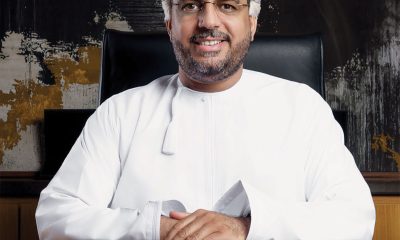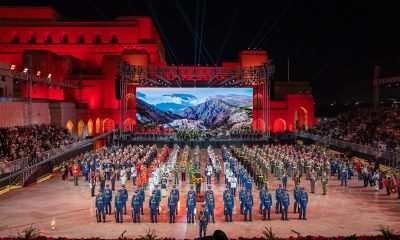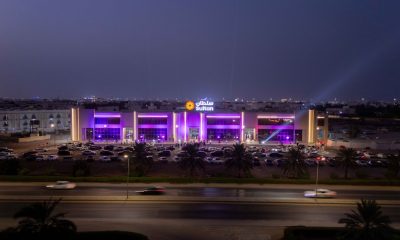Economy
Dubai’s non-oil external trade reaches AED551 billion in H1 2020

(WAM) — Dubai recorded AED551 billion worth of non-oil external trade in the first half of 2020. The emirate’s ability to minimise the impact of the pandemic-induced global economic slowdown on its trading sector reflects its exceptional logistics infrastructure, which enabled it to maintain uninterrupted trade flows and a streamlined supply chain.
Imports accounted for AED320 billion, exports AED77 billion, and re-exports AED 154 billion. A total volume of 44 million tonnes of goods were traded through Dubai including 30 million tonnes of imports, 8 million tonnes of exports and 6 million tonnes of re-exports.
Sultan bin Sulayem, DP World Group Chairman & CEO and Chairman of Ports, Customs and Free Zone Corporation, said the emirate’s external trade sector is capable of overcoming the strong headwinds facing global trade thanks to the depth, resilience, diversity and flexibility of the Dubai economy.
“External trade is one of the key pillars of our economy. We are today reaping the fruits of the vision of our country’s founding leaders and our strong strategic planning, backed by decades of hard work in creating a robust trading and logistics infrastructure. Dubai’s external trade sector has shown a high level of preparedness in dealing with the crisis. It has provided exceptional trading facilities and services to help businesses around the world overcome the challenges of the current period,” he said.
“During the pandemic, Dubai launched several stimulus packages under the directives of His Highness Sheikh Mohammed bin Rashid Al Maktoum, Vice President, Prime Minister and Ruler of Dubai, to support the emirate’s business sector and reduce the impact of prevailing global economic conditions. The economy has efficiently navigated the turbulence in international markets by forging partnerships with markets less affected by the economic crisis. We are optimistic about the future and we will seek to constantly develop our trade business, especially by using new technologies to ensure optimum performance and provide quality trade services,” Bin Sulayem added.
Ahmed Mahboob Musabih, Director General of Dubai Customs, said, “Despite the crisis, customs transactions processed by Dubai Customs surged 41 percent in H1 2020 to reach 7.2 million transactions. Dubai Customs continued to develop and launch new initiatives. These included Siyaj (Fence), the first integrated 24/7 control system in the world created to manage Dubai’s different ports, especially Creek Port and Hamriya Port. Dubai Customs also launched the Cross Border e-Commerce Platform to encourage e-commerce companies to set up their businesses in Dubai.
“Furthermore, Dubai launched the Food Security dashboard that uses artificial intelligence and data analytics to measure the five important indicators of food security: the supply index, stock availability, local production, consumption levels, and the cost of vital commodities in the emirate.”
The World Customs Organisation, WCO, endorsed Dubai Customs’ initiative to launch an international platform for best practices and Authorised Economic Operator, AEO, mutual recognition agreements among AEO members. Dubai Customs will lead the way in facilitating the exchange of secure data between the WCO and member customs administrations. A total of 77 companies have registered as members of the AEO program and around 4.4 million customs transactions were completed through the program in H1 2020, Musabih explained.
Dubai Customs, in cooperation with the WCO and the UAE Federal Customs Authority, is currently preparing to host next year’s 5th WCO Global AEO conference.
Dubai Customs played a vital role during the COVID-19 pandemic in facilitating and supporting the smooth and uninterrupted flow of goods through the global supply chain, in cooperation with its strategic partners. The organisation implemented the stimulus package launched by the emirate’s leadership to help businesses overcome the impact of the pandemic. Its partnership with government departments played a key part in facilitating the clearance of relief shipments sent to friendly countries to help them tackle the crisis.
Dubai’s external trade showed considerable growth in May and June compared to April 2020, a period in which widespread lockdowns were enforced across the globe to combat the pandemic. Dubai’s external trade grew in May compared to April by 17.2 percent to reach AED75 billion, and again grew 20 percent in June compared to May to reach AED90 billion.
The latest external trade figures for H1 2020 show strong integration between different modes of shipping: land, sea and air. Airborne trade accounted for AED250 billion, accounting for 45 percent of total trade. Sea trade reached AED212 billion (39 percent), while land trade touched AED89 billion (16 percent).
Direct trade totalled AED320 billion, representing 58 percent of Dubai’s external trade, while trade through free zones reached AED227 billion (41 percent), and customs warehouse trade weighed in at AED4 billion (1 percent).
China maintained its position as Dubai’s largest trading partner in H1 2020 with AED66.4 billion worth of trade. India came in second with AED38.5 billion, followed by the USA in third place with AED31.7 billion, and Switzerland with AED24.3 billion. Saudi Arabia continued to be Dubai’s largest Gulf and Arab trade partner and its fifth largest global trade partner with AED24.1 billion worth of trade.
Gold, diamonds and jewellery topped the list of commodities in Dubai’s H1 2020 external trade at AED140 billion, followed by telecoms at AED70 billion, and motors in the third place, with AED25.6 billion. Petroleum oils came fourth in the list with AED21 billion followed by computers with AED19 billion.
Foodstuff trade grew 15 percent to 9.1 million tons compared to the first half of 2019 with a value of AED32 billion. Trade in medical supplies and medicines grew 19 percent to AED12.4 billion compared to H1 2019.
The pandemic has further accelerated the shift to online shopping that has been gathering pace for many years. Dubai dispatched 4.3 million e-commerce parcels in H1 2020, with transactions up 150 percent compared to the same period last year. This growth in parcels deliveries was made possible by Dubai’s digital investment and infrastructure that has enabled trade in this sector to flourish with minimal disruption.
-

 OER Magazines2 months ago
OER Magazines2 months agoDossier – ToP 25 Personalities 2025
-

 Dossier2 months ago
Dossier2 months agoArabic Dossier – ToP 25 Personalities 2025
-

 Alamaliktistaad Magazines2 months ago
Alamaliktistaad Magazines2 months agoAl-iktisaad, August 25
-

 OER Magazines2 months ago
OER Magazines2 months agoOER, August 2025
-

 Entertainment2 months ago
Entertainment2 months agoHere’s a Complete Overview of the 2025/2026 Season at the Royal Opera House Muscat
-

 News2 months ago
News2 months agoSultan Center Unveils Flagship Al Hail Store, Elevating Premium Retail Experience in Oman
-

 News2 months ago
News2 months agoHONOR, in partnership with MHD-ITICS Debuts at COMEX in Muscat, Expanding Its Presence in the GCC
-

 IT2 months ago
IT2 months agoAI Zone, Digital Triangle Project Unveiled at COMEX 2025































